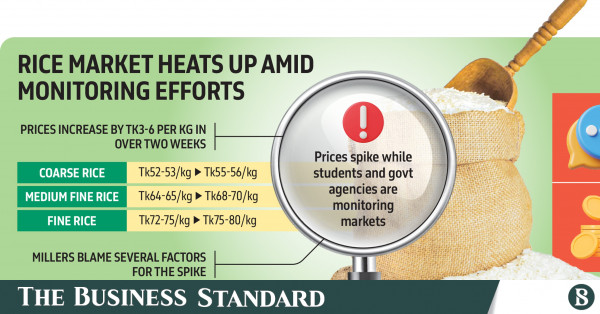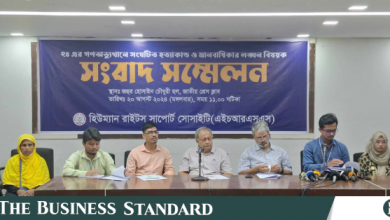Rice prices spike despite student-govt market oversight


Visits to different kitchen markets in Dhaka reveal that rice prices have increased by Tk3-6 per kg in over two weeks, depending on the variety
Infographic: TBS
“>
Infographic: TBS
Rice prices have started to climb despite intensified market oversight by the government and student groups aimed at preventing price manipulation by syndicates.
Visits to different kitchen markets in Dhaka reveal that rice prices have increased by Tk3-6 per kg in over two weeks, depending on the variety.
Coarse rice now sells for Tk55-56 per kg, up from Tk52-53 a month ago. Medium-quality fine rice, such as Najirshail and Miniket, has risen from Tk64-65 per kg to Tk68-70. Finer varieties, previously priced at Tk72-75, are now selling for Tk75-80 per kg.
The Trading Corporation of Bangladesh (TCB) reports slightly lower prices than those in the market, but the prices remain 9.18% higher than the same period last year and 2.88% higher than the previous month.
“The price of rice has risen by at least Tk300-400 per 50kg sack in a week,” Mizanur, owner of Mizan Super Store in Badda, told TBS.
This price surge coincides with ongoing efforts by the Anti-discrimination Student Movement to combat extortion and monitor major markets in Dhaka and across the country.
Market monitoring by the Directorate of National Consumers Rights Protection and students began after Muhammad Yunus took office as chief adviser of the interim government on 8 August.
Retailers blame wholesalers for the price hike, while wholesalers claim that prices were actually higher 7-10 days ago but are now beginning to decline. They also point to the current cash withdrawal limit as a factor in the reduced rice supply.
Despite the Tk3 lakh withdrawal limit from banks, there are no restrictions on transferring money through banking channels.
Md Anisur Rahman, a rice trader at Mohammadpur Krishi Market, told TBS that although prices were recently high, they have started to decrease and are expected to drop further. He called for increased monitoring of corporate vendors and mill owners.
However, Nirod Baran Saha, president of the Naogaon Paddy and Rice Dealer and Business Association, said rice prices have not risen at mill gates and believes that monitoring wholesalers in Dhaka would help bring prices down.
“A 15-tonne truck carries over Tk10 lakh worth of rice, but many traders are unable to transfer money due to the Tk3 lakh withdrawal limit, causing supply issues,” he added.
Masud Rana, owner of Maa Bhandari Auto Rice Mill in Kushtia and organising secretary of the Rice Mill Owners’ Association, said that rice prices have risen due to the increased cost of paddy, which has climbed by Tk200-Tk300 per maund [37.32 kg].
He explained that mill owners have not stockpiled paddy this year and are buying it regularly from the market, driving prices higher.
The Department of Agricultural Extension reports that Boro season rice began harvesting in mid-April, with an expected production of over 2.20 crore tonnes this season, marking it as the largest rice production season due to favourable conditions.
Some believe that a syndicate of traders is responsible for the price increase three months after the bumper harvest.
The Ministry of Food reports that the government’s rice reserves are in good condition, with a current stock of 19,15,665 tonnes of foodgrains, including 1,784,153 tonnes of rice.
Five kg of rice is being distributed to one crore families each month through TCB at a rate of Tk30 per kg.
In response to rising prices, the Bangladesh Competition Commission scheduled a meeting for Thursday (22 August) with coordinators of the Anti-discrimination Student Movement, regulatory agency officials, and rice mill owners and traders from across the country.
However, the meeting was postponed on Wednesday (21 August), according to a notice signed by the commission’s Director Md Manjurul Hasan.
Commission Chairperson Pradip Ranjan Chakraborty said the rescheduled meeting will take place sometime next week.




